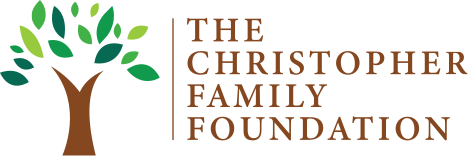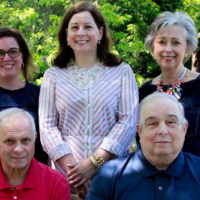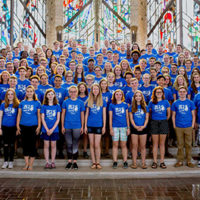The opportunity to convene CFF grantees for professional learning, peer-sharing, and networking is always a treat. In these workshops, we bring expert instructors into intimate problem-solving conversations with our grantees to create actionable work plans. Plus, these events offer the chance for nonprofit colleagues to talk with one another about successes, challenges, and what’s coming down the pike for their organizations. (Lots of caffeine and delicious goodies always help get the ideas flowing, too.)
Building off feedback from this fall’s workshop participants, we identified two additional areas of fundraising to explore as a group—navigating the world of corporate giving and beefing up the fundraising chops of an organization’s board. We lined up two expert speakers—Carolyn Nopar and Brian Becker—and set a date to convene: March 20.
When the world began to #canceleverything, we thought we would simply postpone the workshop to the fall. Truthfully, we were skeptical that much could be accomplished from a virtual workshop. Didn’t the magic of professional development—the aha! moments, the serendipitous connections—happen because we were in the same room with one another? But as the pandemic further took hold alongside the longstanding pandemic of institutional and structural racism, we knew we couldn’t wait any longer. We wanted to connect with our partners and share Carolyn and Brian’s expert guidance so it could be put to use right away.
On August 27, Carolyn led a conversation on successful ways of recruiting, cultivating, and stewarding corporate donors. She shared overarching themes in corporate fundraising based on a study group organized by her firm, the Chicago Fundraising Accelerator. Major themes included uncertainty, increased access to stakeholders (since so many of us are working from home), and reliance on existing supporters like board members to make introductions.
Carolyn encouraged participants to consider their organization’s value proposition, keeping in mind that companies are eyeing the Gen Z demographic, since those born between 1995 – 2015 will represent 40% of the consumer market by 2021 and are 69% more likely to buy from a company that contributes to social causes. (Source: Michael Pankowski, Ad Age, February 13, 2020.)
Finally, Carolyn encouraged organizations to embrace virtual stewardship and cultivation tools, such as setting up Google alerts and RSS Feeds to track business developments and staff engagements. These were important takeaways for several workshop participants. Andrea Bateman of Chicagoland Lutheran Educational Foundation commented that the best features of the workshop were “The ‘simple’ ways that we can connect with corporations such as sharing what corporations are doing or attending speeches they are giving to connect. These are things that we all can do easily with little to no cost, yet make a big impression.”
The following week, on September 2, Brian Becker took the virtual stage to highlight ways in which organizations can build the fundraising capacity of their boards. Brian walked participants through what he calls the “Six G’s of Successful Boards—Govern, Generate, Give, Get, Go, and Get Off,” as well as the primary responsibilities of a board. Brian encouraged participants to consider how the culture of their board stems directly from the relationship between the Board Chair and Executive Director.
Twice during the workshop, participants moved into small groups to learn directly from one another. In the first breakout, participants considered what their organization might do to improve the trust level—reputation, brand, community perception, etc.—between a prospective board member and the organization. The conversation generated a flood of ideas such as: establishing a long cultivation process during which commitment and engagement skills can be developed, ensuring transparency around organizational growth and financials, outlining clear and measurable board expectations in writing, and much more.
The conversation then turned to board recruitment, and Brian encouraged participants to start with “What” rather than “Who.” What does the organization need, in terms of strengths, assets and addressing existing gaps? Once those questions are answered, who can we identify that can speak to those needs?
Workshop participants expressed enthusiasm to put these ideas to work. “I’m excited to share my learnings and these resources with other members of our leadership team,” shared Shane Morris of Code Nation. “We’re right in the middle of an improvement process for our board engagement, so this was a super timely training.”
Thank you to Carolyn and Brian for proving to us skeptics that virtual workshops can be beneficial, and most importantly, a huge thank you to the staff and board members who took time out of incredibly busy schedules to spend time learning with us. To request access to workshop recordings, please email molly@christopherff.org.
—Contributed by Molly Truglia, Program Associate


 About Us
About Us Programs
Programs